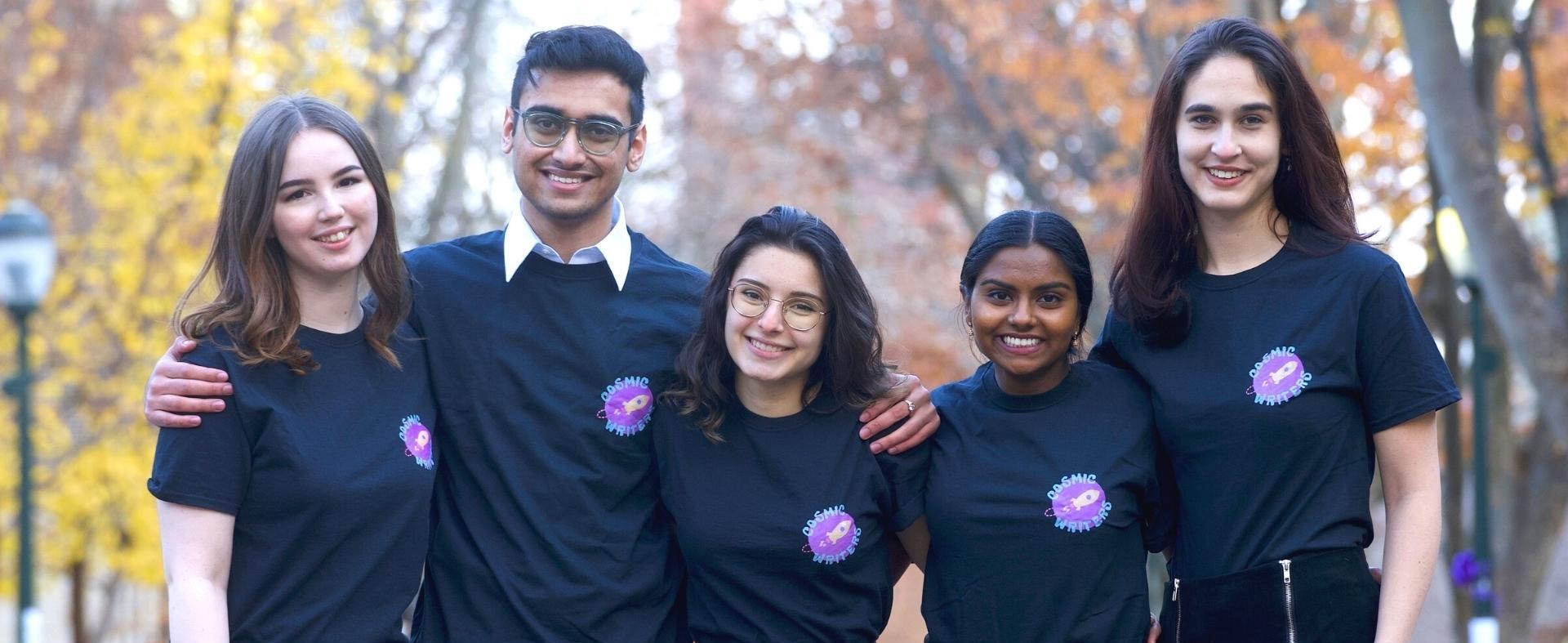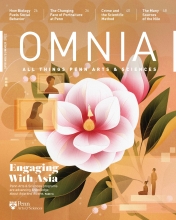Creative Writing for All
With virtual and in-person programming through Cosmic Writers, Rowana Miller, C’22, wants to make writing education equitable—and fun.
Remember spring 2020? There was that one day in March when things seemed to shift: The World Health Organization declared that COVID-19 was officially a pandemic; then-President Trump banned travel from Europe; actors Tom Hanks and Rita Wilson announced their diagnoses; and the NBA suspended the remainder of the season. A series of additional suspensions and cancellations followed, at first just for a few weeks, then a few more weeks, and then the summer looked uncertain.
Rowana Miller, C’22, wanted to do something for school-age kids who were looking at a summer with no camps, no enrichment programs, and limited time with friends. She also wondered if she could support college students whose summer jobs and internships no longer seemed viable. Enter Word Camp, an online creative writing program that Miller designed. “At first the primary goal wasn’t writing education,” Miller explains. “It was more geared toward fun and engagement during a difficult summer.”
Miller submitted her idea for Word Camp to the Kelly Writers House and was awarded the Kerry Sherin Wright Prize, which funds student-developed programs. Key to her idea was the fact that Word Camp, staffed by Penn students, would be virtual from the start, rather than try to adapt an in-person program, and available to kids regardless of their location.
It was Kelly Writers House brought Miller to Penn, after a creative writing teacher in high school mentioned it in class. After school that day, Miller went home, looked up the Writers House, and emailed Jamie-Lee Josselyn, Associate Director for Recruitment, for more information. She was hooked.
“The house has been a community to me my entire time in college,” Miller says. “I love that its environment is in large part constructed by the students who work there. But at the same time that it's structured by a group of faculty who really cares about students. And it offers so many different opportunities for students to figure out what they care most about and what work they want to pursue.”
For Miller, figuring out what she cares about most has meant trying new things and seeing where they lead. When she arrived at Penn, she realized that she could hone her writing skills in majors other than English. She considered history, but then remembered her feelings about history class in high school: “I liked history, except for the part where it was in the past.” But she really liked how studying history could help people understand today’s society. So, she tried a sociology class.
“Sociology wasn't on my radar until I went to college. I took a freshman seminar called Poverty and Inequality, taught by Dr. Regina Baker. And that class just encompassed everything that I loved about history before, and that I still love about learning history.” Except now, the class focused on the present. Once again, Miller was hooked. Next, she added an urban education minor to complement her sociology major and creative writing minor.
Miller’s combined interests created the perfect recipe to start Word Camp and help it evolve into something more. Along with a team of passionate fellow students, Miller is moving beyond summer camps with a nonprofit called Cosmic Writers, which provides virtual and in-person writing workshops for young writers, in addition to expanding camp offerings. Cosmic Writers picks up what Word Camp Started, and runs with it.
“It's really important to me that the workshops operate using pedagogy that is equitable, and that does not center the upper middle-class experience, because a lot of the time learning norms are centered around the norms of upper middle-class white children,” Miller explains. “So, I work with instructors to make sure they are using more flexible pedagogy and to adapt the structure of the camp to lean into the equity mission.”
Being virtual, and thus accessible to children from across the country, is a big part of equity. But Miller points out that access is not the only issue.
“Being able to teach writing in this extracurricular context gave the camp the freedom to really make it fun.”
She says, “Writing itself is a tool for communication that is so essential to socioeconomic mobility. And I think that a flaw with how a lot of writing is taught is that it tends to be presented as a chore. Being able to teach writing in this extracurricular context gave the camp the freedom to really make it fun. And kids who are excited about writing are going to write more and kids who write more are going to be better communicators and have higher levels of literacy.”
Cosmic Writers is off to a strong start. After officially launching in late January, the organization is planning three in-person afterschool workshops for the spring—two with the Kirkbride School, and one with the Walnut West Library—and a full season of Word Camp this summer.
Writing has always been a part of Miller’s life. Her first job was as a writing tutor at her high school, and she has been working at Kelly Writers House, where she is now the Levin Outreach Coordinator, since her first semester. She started writing novels in her early teens, and her latest manuscript lead her to getting a literary agent. As she considers her accomplishments and interests, her continual involvement in education stands out.
“When I started Word Camp, I thought, maybe it's not an accident that I keep falling into writing education. Maybe it's the thing that I'm most passionate about,” she says. “And now I am trying to build a career in it, and I feel so much more secure in this as a path for my future, than I have for any other career that I've considered.”




